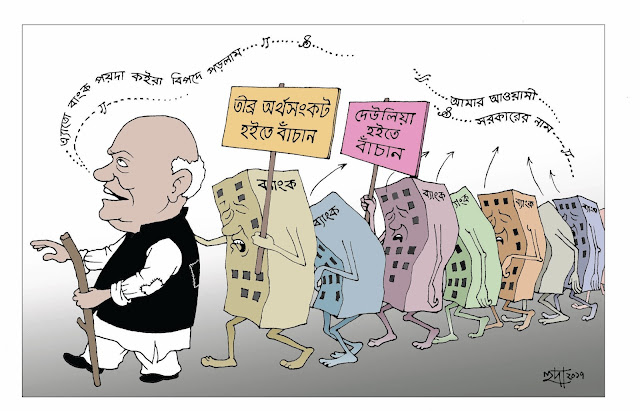Rejaul Karim Byron and Sohel Parvez
Bangladesh is likely to lose about $2.7 billion in export earnings every year once it graduates from the Least Developed Country bracket, where it has been for 43 years.
Upon graduation from the LDC status, exports will be subjected to 6.7 percent additional tariff as duty-free and quota-free benefits from different countries and trading partners will be withdrawn.
The disclosure came in a paper prepared by the Economic Relations Division on the challenges and opportunities related to transitioning from LDC.
The study comes as a United Nations panel, the Committee for Development Policy, is expected to put Bangladesh in its graduation list this year as the country meets all three criteria: Gross National Income (GNI) per capita, Human Assets Index (HAI) and Economic Vulnerability Index (EVI).
The CDP will review Bangladesh's progress in 2021, and after a three-year transition period official graduation from the LDC category will take place.
At present, Bangladesh is a major user of duty-free and quota-free market access, with shipments under this facility accounting for 72 percent of the total exports in fiscal 2015-16, the ERD report said.
Bangladesh enjoys preferential market access to more than 40 countries in varying degrees, said the Centre for Policy Dialogue in a similar study in March last year. The private think-tank came to the same conclusions as the ERD.
“Regional trade agreements and bilateral initiatives cover about 90 percent of the total exports, and thus preferential market access is of special significance,” the ERD report said.
Of note is the preferential treatment by the EU, where 54 percent of Bangladesh's shipments are headed. After graduation, Bangladesh's exports will face 8.7 percent tariffs, according to the CPD.
“Undoubtedly upon LDC graduation, products made in Bangladesh will become more expensive to buyers and consumers in key export markets,” said the ERD report that will be presented at the two-day Bangladesh Development Forum that begins in Dhaka today.
The United Nations Conference on Trade and Development estimates Bangladesh's exports may decline 5.5 percent to 7.5 percent.
The preference erosion in major exporting countries will thus have implications for export competitiveness and export earnings, and consequently, GDP, employment and poverty, the CPD said.
“On the one hand, we will lose some opportunities. But on the other hand, new avenues of opportunity will be opened,” said ERD Secretary Kazi Shofiqul Azam at a press conference on Monday ahead of the BDF.
The ERD report recommended the commerce ministry take initiatives to make policy arrangements for exporters and manufacturers to support them during and after graduation from the LDC category.
Alongside increasing domestic resource mobilisation, the report advised the government to improve road, power, and port facilities to offset the effect of lost preferences in export markets.
Heightened efforts are necessary to diversify exports in order to reduce vulnerability of Bangladesh economy, it said.
It is not just in export markets, as the country will also be hit when it comes to foreign aid.
Concessionary financing from the International Development Association, the part of the World Bank that helps the world's poorest countries, and multilateral assistance with special benefits will also not be available upon attaining the middle-income status.
The benefit of technical cooperation and other forms of assistance such as fund support for scholarship, fellowship, participation for special training as well as for research will be pulled out.
Many of the fast-track projects under the Prime Ministers' Office such as the Matarbari Power Hub, Dhaka Metro Rail and Karnaphuli River Tunnel will require external borrowing and might not be financed from traditional concessional borrowing.
As per the WB's criteria, if the country's per capita income remains above $1,400 for three consecutive years, the rate of interest would become about 2 percent in contrast to 0.75 percent at present.
While Bangladesh has a solid track record of prudently managing its public debt and debt service payments, there is a risk that the foreign debt burden may increase due to the phasing out of the concessional facilities, the ERD report said.
Subsequently, the current strategy of prudent utilisation of concessional borrowing should be emphasised. But Finance Minister AMA Muhith at Monday's press conference dismissed such concerns.
Bangladesh's foreign aid dependence has declined substantially: it accounts for 1.3 percent of the country's gross domestic product, he said.
“So, there will be no problem in implementing programmes for attaining Sustainable Development Goals,” Muhith said, adding that there are $37 billion of foreign loans in the pipeline. The ERD report said under-nourishment could also remain a concern after graduation.
So, activities related to social developments, including health and education, should remain the core area of the development policy along with increased coverage of the social safety net programmes to address extreme poverty.
Risks like high poverty and inequality, low human capital and weak economic governances have to be tackled effectively and be minimised to a reasonable level.
Emerging risks like climate change, violent extremism and managing shock and vulnerabilities like Rohingya crisis are to be managed with extreme care and attention.
- Courtesy: The Daily Star/Jan 17, 2018
- Cartoon Mehedi/New Age













